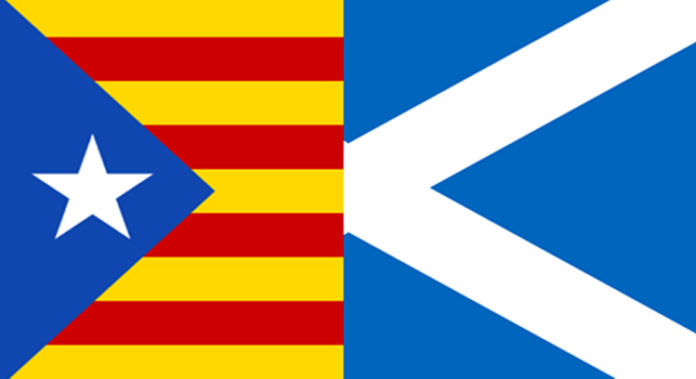
THE LEADER of Spain’s Catalonia region, Carles Puigdemont, has called an independence referendum for October 2017, in defiance of the Spanish Government.
The announcement follows Catalonia holding a non-binding vote in 2014, called a ‘consultation’, on independence in which 80 percent of ballots cast supported a breakaway, but with only a 35 percent voter turnout.
Madrid rejected the vote as Spain’s Constitutional Court had previously ruled it illegal because it violated the Constitution.
Under Spanish law, only the central government has exclusive competencies to hold referenda. The situation is comparable to Scotland and the rest of the United Kingdom.
There, as in Spain, it is under the purview of the government to grant the legal right to hold a referendum. For Spain this is outlined in the Constitution, and used for exceptional issues like political reform after Franco, to approve a new constitution and Spain’s entry into NATO, but not yet for a discussion on secession.
In the UK, powers were temporarily transferred with the consent of Westminster to Holyrood for the Scottish independence referendum (constitutional issues are reserved to the state under the Scotland Act 1998).
The Scottish Parliament, even while under the yoke of the SNP for ten years, has flirted with, but never dared launch an illegal referendum. It’s a pertinent detail given the original vote was lost by 45 per cent and the SNP lost 21 seats in the 2017 general election.
The situation is, of course, different: the call for Catalonian independence is inherently different due to the forcible removal of its historic political and cultural autonomy.
While the UK has been a unitary state since 1707, for much of the 18th and 19th centuries Scotland enjoyed extremely decentralised control over its law, education and health and again after 1999.
While some Scottish and Catalan nationalists want to draw comparisons between their nations, there are significantly fewer historical similarities than they think.
The Spanish Government, under the Constitution, also has the power to intervene in Catalonia’s government if it is not respecting the rule of law. If there’s a powerful lesson from Scotland for Madrid, as well as Catalan separatists, then it’s that a plebiscite by law carries significantly more weight isn deescalating tensions than never-ending, neverendums.
It’s perhaps worth remembering what the contentious, boorish and occasionally correct Alex Salmond said in 2014:
“Nobody has lost their life arguing for or against Scottish independence…nobody has had so much as a nosebleed. That’s not unique, but it’s a very, very precious thing.”








